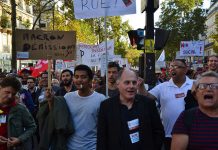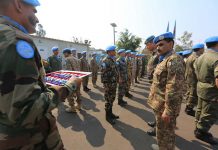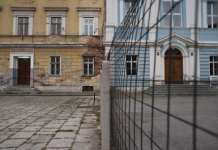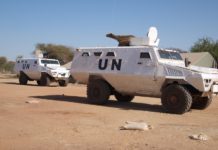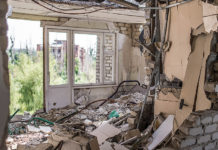In the last month, the kingdom of Bahrain has witnessed massive demonstrations against the ruling government that have been twice met with a brutal crackdown by government security forces. Inspired by the popular protests in Egypt and Tunisia, demonstrations in favour of democratic reform began in Bahrain, on Feb 14, 2011.
The demonstrations escalated over the following days and well before dawn on Feb 17 anti-riot police stormed the Pearl Roundabout and used lethal firepower. Many demonstrators and health personnel were wounded, some fatally. In the weeks that followed, there were calls for dialogue between the government and the protestors and release of a number of political prisoners as a gesture of good will.
The momentum for talks has stalled and in the last few days we have seen a doubling down on the strategy of ending the stalemate by force. There has been an influx of troops from neighbouring Gulf countries and the declaration of a state of emergency that has again resulted in scores of wounded, assaults on medical personnel and facilities and at least five additional fatalities.
On Feb 21, I flew into Bahrain to join two Amnesty International staff members already on the ground to try to piece together the course of events. The picture that emerges from our research is one of large-scale anti-government protests that were met with the use of excessive force by security forces; intense pressure on the emergency and medical services; an atmosphere of mistrust where rumours filled the void left by lack of clear and regular communication by government officials; and one of a lack of accountability by those responsible. An account of the protests and their aftermath has now been published by Amnesty International.[1]
The popular agitation escalated following the fatal shooting of ‘Ali ‘Abdulhadi Mushaima’, 21, at a demonstration on Feb 14 in a village outside the capital. During the funeral the next day, attended by thousands of Bahrainis, a second protester was shot dead by security forces. Public anger was mounting and on 16 February crowds gathered in the Pearl Roundabout– a major intersection in the capital Manama.
In a pre-dawn raid on Feb 17, police and military personnel entered the Roundabout and began to physically eject those present as well as removing the tents in which many demonstrators were sleeping. The use of shotguns, in some cases at close range, in addition to anti-riot munitions such as rubber bullets and tear gas resulted in at least five deaths and scores of injured.
The majority of injuries sustained on Feb 17 were caused by shotgun wounds. While the majority of patients suffered non-lethal injuries, the fatalities on that day were from gunshots fired from extremely close range. Furthermore, the patterns of injuries – involving wounds to the head, neck and chest, revealed either a lack of training in non-lethal use of force by security personnel or a lack of adherence to these principles.
Ambulance crews conveyed wounded from the Roundabout to the Salmaniyeh Medical Center (SMC) for several hours but then were forcibly stopped around dawn by security personnel who stated the area was closed and no further wounded were left to transport. Unofficial reports continued of additional dead and wounded and ambulance staff that tried to enter the square to investigate were beaten and had their vehicles damaged by security officers. One medic suffered a fractured arm while another crew had their vehicle confiscated and were forced to return to the hospital on foot. The Ministries of Health and the Interior later reversed this policy and ambulances, again, returned to the Roundabout but there were no further injured identified at that time.
In addition to the assault on medical transporters, Dr Sadiq al Ikri, a consultant plastic surgeon, who was volunteering his services in a first aid tent in the roundabout, was also severely beaten by security forces. Despite his role, his clothing identifying him as medical personnel and his explanations to officers, he was repeatedly beaten and detained. He was later taken to the SMC where he was admitted and diagnosed with severe head and chest injuries that required operative repair.
The shocking use of force against the protestors and medical personnel as well as the decision to prevent access to the roundabout by ambulance crews fuelled widespread rumours of a concerted effort on the part of the government to prevent ambulance and emergency services staff from responding to the wounded. We met with numerous officials, medical staff as well as the head of the Emergency Medical Services who provided minute-by-minute records of the activities of ambulance crews and adamantly denied any such policy.
The events of the last few days that have seen the encircling of major hospitals by security forces; resulted in the resignation of the health minister in protest; and the condemnation by the UN Human rights chief, Navi Pillay, of such “blatant human rights violations” may signal a change in attitude on the part of the Bahraini authorities.
The pattern of gunshot wounds to the chest, neck and head fired from close range during the initial attack on the Pearl Roundabout, suggested a lack of adherence to non-lethal strategies for crowd control, lack of discipline or deliberate use of lethal force. There are several news reports over the last 24 hours of similar shotgun wounds to the head and chest inflicted on protestors.
These attacks and the assaults on medical workers in Bahrain constitute a major breach of human rights, a failure of professional policing and respect for emergency medical services. The security situation has deteriorated and no serious political dialogue appears to be taking place. The introduction this week of foreign troops in the Kingdom in an effort to put down the demonstrations further raises tensions and the possibility for additional violations. The international community must speak out forcefully against these abuses and advocate for a negotiated solution to the civil conflict in Bahrain.
[1] Amnesty International. Bloodied but Unbowed: Unwarranted state violence against Bahraini protesters – Index: MDE 11/009/2011
Read The Amnesty International’s report (in french)
Hani Mowafi
Derniers articles parHani Mowafi (voir tous)
- Bahrain : what happened – 2 avril 2011

